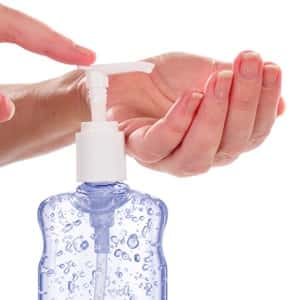
COVID-19 changed how people wash their hands. For months it was hard to find alcohol-based (ethanol) hand sanitizers. That’s because there was a run on such products. Then there were reports that quite a few hand sanitizers were contaminated. First it was wood alcohol (methanol) that was the problem. Then it was benzene that was found in some hand sanitizers. Now a reader wants to know whether you can absorb alcohol or any of the contaminants through the skin after using hand sanitizers.
Are We Safe If We Continue Using Hand Sanitizers?
Q. I am wondering about the safety of all the hand sanitizers. How much of the alcohol is absorbed through the skin and what effect does that alcohol have on our systems?
A. Thank you for this interesting question. A study published in the journal Alcohol and Alcoholism (June 25, 2020) suggests that this is not a problem.
The authors performed a small experiment in which subjects applied generous quantities of alcohol-based sanitizer to their hands.
The researchers conclude:
“Despite the small number of subjects and measurements, this anecdotal study strongly indicates that contrary to repeated claims, significant cutaneous absorption of ethanol from even frequent use of hand sanitizers or other ethanol-containing liquids does not occur.”
Who Should Worry About Using Hand Sanitizers?
Most of us probably would not worry about absorbing a tiny amount of alcohol after using hand sanitizers as long as we weren’t vulnerable to a DUI (driving under the influence) arrest. But there is one group of people for whom even a tiny bit of alcohol could pose a serious problem.
People with an alcohol abuse disorder are sometimes given the drug disulfiram (DSF also known as Antabuse). This medication will make people very sick if they ingest alcohol. The theory has been that if people with an alcohol problem take DSF every day, they will be discouraged from drinking any alcoholic beverage. That’s because the drug inhibits an enzyme called acetaldehyde dehydrogenase. Blocking this enzyme interferes with the normal metabolism of alcohol.
Imagine the worst hangover of your life that hits within 10 to 30 minutes after exposure to alcohol. This is called aversive conditioning.
Disulfiram-Induced Symptoms After Exposure to Ethanol:
- Flushing, sweating, feelings of warmth on face and chest
- Dizziness, unsteadiness, fainting
- Shortness of breath, breathing difficulties
- Digestive upset, nausea, vomiting
- Vision difficulties
- Rapid pulse, pounding heart, palpitations, chest pain
- Feelings of discomfort, confusion, weakness
- Horrible headache, neck throbbing
- Terrible thirst
In extreme situations, people taking DSF who drink too much too fast can end up with dangerous irregular heart rhythms or even a heart attack. Convulsions and coma are other extreme reactions.
Will Using Hand Sanitizers Precipitate a DSF Reaction?
Not surprisingly, clinicians want to know if the ethanol in hand sanitizers poses a problem for patients taking disulfiram.
Here is how the researchers describe their study:
“The editor of Alcohol and Alcoholism invited us to comment on a submission (De Sousa, 2020) that in its original draft suggested that disulfiram (DSF) may cause a typical disulfiram–ethanol reaction (DER) when ethyl alcohol (ethanol) is absorbed through the skin after the use of ethanol-containing hand sanitizers. Textbooks of alcoholism treatment and product information sheets often claim that as well as avoiding alcohol in food or drink, patients taking DSF should not apply ethanol-containing perfumes or after-shave lotions to the skin because this may cause a DER.”
The authors applied a “generous” amount of hand sanitizer gel (70%) on the hands of the subject. They also performed other experiments where subjects had to breathe the alcohol “fumes” with the hands held close to the mouth and nose.
The results of this research suggest that not enough alcohol is absorbed through the skin to be detectable.
When it comes to warnings about not using hand sanitizers when taking disulfiram, the authors conclude:
“Even without further and more detailed studies, the traditional warnings in textbooks, papers, formularies and product information sheets should probably be modified accordingly.”
Based on this small study, we doubt that enough alcohol is absorbed through the skin to pose a problem for most people. That said, we would still discourage anyone from using hand sanitizers contaminated with methanol or benzene. And no one should ever drink hand sanitizer! If it does contain methanol (wood alcohol), it could produce horrific complications!

